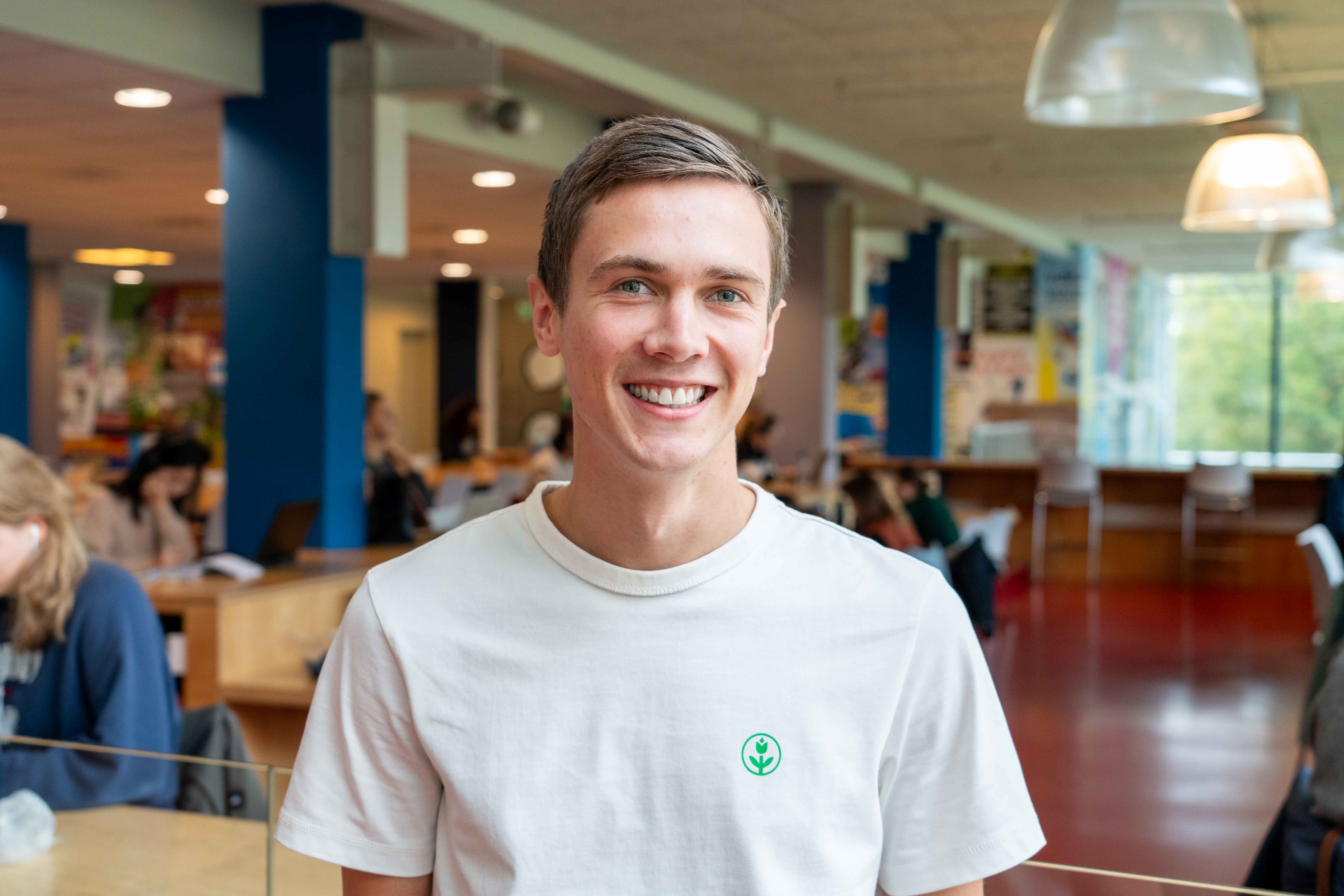
Study technology and operations management in Groningen and learn to use big data, analytical tools, and real-life experience to shape a sustainable, human-centric, resilient business environment.
Are you eager to help today’s organizations make the most of the vast volumes of data they collect? Would you like to apply your expertise in data and tech at the operational heart of a company for the benefit of that company, the environment, and society?
In the MSc Technology and Operations Management, you will learn how to master these from a managerial perspective, having at the same time an understanding of the technology-related implications, opportunities, and limitations. The programme has a strong emphasis on data analytics, data science, programming skills, and the use of simulation and mathematical models. These will provide you with the ability to gather data from complex data sources and use it to make effective managerial decisions so that you can help companies realize their objectives — let these be related to sustainability or operational excellence.
Following your graduation, you will have a large variety of career prospects. Our graduates become, among others, data analysts, supply chain professionals, project managers, production managers, maintenance engineers, and consultants. They work at companies such as ASML, Philips, KPMG, FrieslandCampina, and Accenture.
The curriculum involves five compulsory courses that focus on applications of data science, programming, mathematical modeling, and simulation in the field of technology and operations management. In these courses, you will also develop an understanding of the technical aspects of processes and systems, and knowledge of research methods. Building on this foundation, you personalize the programme through three elective courses from a wide variety of options that will set you up with skills in management, operational strategy, digitalization, data-driven processes, healthcare operations, sustainability, energy, innovation, and many more (see the full list on our course catalogue). There is also an opportunity to deepen your knowledge of our Focus Area Energy Transition and Climate Change. Then, you will complete your degree by writing a Master's thesis.
| Semesters | ||||
|---|---|---|---|---|
| CoursesCourse Catalog > | 1a | 1b | 2a | 2b |
| Data Analysis and Programming for OM (5 EC) | ||||
| Facility Design and Planning (5 EC, optional) | ||||
| Operations Management and Control (5 EC) | ||||
| Elective(s) MSc TOM (10 EC) A few examples are: Service Operations; Sustainability: Strategies, Innovation & Change; Data-driven Business Processes; Digital Transformation Strategy; Healthcare Operations; Supply Chain Analytics; Innovation & Entrepreneurship; Sales and Operations Planning. The full list of electives can be found on Ocasys. | ||||
| Operations Modelling and Simulation (5 EC) | ||||
| Research Methods for TOM (5 EC) | ||||
| Smart Industry Operations (5 EC, optional) | ||||
| Sustainable Energy Supply (5 EC, optional) | ||||
| Asset Management (5 EC) | ||||
| Technology-enabled Innovation (5 EC, optional) | ||||
| Master's Thesis TOM (20 EC) | ||||
| Inventory Management (5 EC, optional) | ||||
| Programme options |
|---|
| Master Internship (specialization) Opportunity to gain work experience by doing an internship in the second semester of your study. You will be rewarded 15 ECTS on top of your programme. Your thesis will be postponed to the third semester. |
| Energy Transition and Climate Change Focus Area (specialization) Focus on the serious changes within the energy sector by dealing with issues such as how firms adapt to renewable energy, how the higher taxes are managed during this transition and how to deal with the weather dependent production of energy systems. Gain the knowledge and skills to shape a sustainable future in this evolving energy sector. |
| Specific requirements | More information |
|---|---|
| previous education |
Below you will see a table with 'transfer options' for Dutch research universities that give access without additional requirements. Please check this for your Bachelor's degree. Some non-listed management-related or engineering-oriented degrees from research universities may also give access without additional requirements, depending on the courses you have followed. If you believe you may be admissible without additional requirements, please contact the programme coordinator for further clarification: Onur Kilic o.a.kilic rug.nl. In all other cases (including all degrees from universities of applied sciences) a Pre-Master's programme is required. We offer a 30 EC programme starting in September, allowing you to start the Master's programme in February. See https://www.rug.nl/feb/premaster. The information about entry requirements is an indication of your admissibility. Every application will be reviewed individually by the Admissions Board so the admission decision may differ from the indication in this table. |
| Study programme | Organization | Transition |
|---|---|---|
| Business Administration | Erasmus University Rotterdam | No additional requirements |
| Economics and Business Economics | Erasmus University Rotterdam | No additional requirements |
| Econometrics and Operations Research | Erasmus University Rotterdam | No additional requirements |
| International Business Administration | Erasmus University Rotterdam | No additional requirements |
| Study programme | Organization | Transition |
|---|---|---|
| International Business | University of Groningen | No additional requirements |
| Econometrics and Operations Research | University of Groningen | No additional requirements |
| Industrial Engineering and Management | University of Groningen | No additional requirements |
| Business Administration | University of Groningen | No additional requirements |
| Economics and Business Economics | University of Groningen | No additional requirements |
| Study programme | Organization | Transition |
|---|---|---|
| International Business | Maastricht University | No additional requirements |
| Business Engineering | Maastricht University | No additional requirements |
| Economics and Business Economics | Maastricht University | No additional requirements |
| Econometrics and Operations Research | Maastricht University | No additional requirements |
| Business Analytics | Maastricht University | No additional requirements |
| Study programme | Organization | Transition |
|---|---|---|
| Economics and Governance | Wageningen University | No additional requirements |
| Management and Consumer Studies | Wageningen University | No additional requirements |
| Nutrition and Health | Wageningen University | No additional requirements |
| Study programme | Organization | Transition |
|---|---|---|
| Industrial Design | Eindhoven University of Technology | No additional requirements |
| Data Science (joint degree) | Eindhoven University of Technology | No additional requirements |
| Innovation Sciences | Eindhoven University of Technology | No additional requirements |
| Industrial Engineering and Management | Eindhoven University of Technology | No additional requirements |
| Computer Science & Engineering | Eindhoven University of Technology | No additional requirements |
| Study programme | Organization | Transition |
|---|---|---|
| Business Administration | VU University Amsterdam | No additional requirements |
| Economics and Business Economics | VU University Amsterdam | No additional requirements |
| International Business Administration | VU University Amsterdam | No additional requirements |
| Econometrics and Operations Research | VU University Amsterdam | No additional requirements |
| Business Analytics | VU University Amsterdam | No additional requirements |
| Study programme | Organization | Transition |
|---|---|---|
| Business Administration | Nyenrode New Business School | No additional requirements |
| Study programme | Organization | Transition |
|---|---|---|
| Economics and Business Economics | Utrecht University | No additional requirements |
| Study programme | Organization | Transition |
|---|---|---|
| International Business Administration | University of Twente | No additional requirements |
| Industrial Design Engineering | University of Twente | No additional requirements |
| Business Information Technology | University of Twente | No additional requirements |
| Management, Society and Technology | University of Twente | No additional requirements |
| Industrial Engineering and Management | University of Twente | No additional requirements |
| Technical Computer Science | University of Twente | No additional requirements |
| Study programme | Organization | Transition |
|---|---|---|
| International Business Administration | Tilburg University | No additional requirements |
| Economics | Tilburg University | No additional requirements |
| Econometrics and Operations Research | Tilburg University | No additional requirements |
| Entrepreneurship and Business Innovation | Tilburg University | No additional requirements |
| Study programme | Organization | Transition |
|---|---|---|
| Business Analytics | University of Amsterdam | No additional requirements |
| Business Administration | University of Amsterdam | No additional requirements |
| Actuarial Science | University of Amsterdam | No additional requirements |
| Economics and Business Economics | University of Amsterdam | No additional requirements |
| Econometrics and Data Science | University of Amsterdam | No additional requirements |
| Study programme | Organization | Transition |
|---|---|---|
| Industrial Design | Delft University of Technology | No additional requirements |
| Computer Science & Engineering | Delft University of Technology | No additional requirements |
| Systems Engineering, Policy Analysis & Management | Delft University of Technology | No additional requirements |
| Study programme | Organization | Transition |
|---|---|---|
| Computer Science | Leiden University |
No additional requirements More information:For students following the profile Computer Science & Economics. |
| Public Administration Science | Leiden University |
No additional requirements More information:For students following the profile Economics, Public Administration and Management. |
| Study programme | Organization | Transition |
|---|---|---|
| Business Administration | Radboud University Nijmegen | No additional requirements |
| Economics and Business Economics | Radboud University Nijmegen | No additional requirements |
Students with a Dutch diploma can apply directly to Studielink. More information on the steps to apply .
| Type of student | Deadline | Start course |
|---|---|---|
| Dutch students | 15 October 2025 | 01 February 2026 |
| 01 May 2026 | 01 September 2026 | |
| 15 October 2026 | 01 February 2027 | |
| EU/EEA students | 15 October 2025 | 01 February 2026 |
| 01 May 2026 | 01 September 2026 | |
| 15 October 2026 | 01 February 2027 | |
| non-EU/EEA students | 15 October 2025 | 01 February 2026 |
| 01 May 2026 | 01 September 2026 | |
| 15 October 2026 | 01 February 2027 |
| Specific requirements | More information |
|---|---|
| previous education |
To be eligible for admission to this Master, you need to hold an academic Bachelor's or Master's degree from a research university in one of the following - or closely related - fields: Business Economics, Business Administration, Econometrics and Operations Research, Economics and Business Economics, International Business, Industrial Engineering, Technology Management. To assess whether your educational/academic background meets the specific programme requirements, we will consider the level and curriculum of your previous studies. For more information, please visit: https://www.rug.nl/feb/apply-msc. If you have any questions concerning admission to this programme, please contact our Admissions Office: https://www.rug.nl/admissions. |
| language test |
IELTS Academic overall score 6.5 (Speaking 6, Writing 6.5); TOEFL internet-based overall score 90 (Speaking 20, Writing 24); Cambridge C1 Advanced or C2 Proficiency (overall score 176, Speaking 169, Writing 176). |
| other admission requirements |
Not meeting the pre-education requirements for direct entry? Please read more about our pre-Master programmes. |
Students have to apply via Studielink and the Progress Portal (replacing the previous system, Online Application System OAS) of the University of Groningen. After you apply for the programme of your choice, the Admissions Office will evaluate your educational background and assess your eligibility. Your application will be assessed on an individual basis. More information on how to apply.
| Type of student | Deadline | Start course |
|---|---|---|
| Dutch students | 15 October 2025 | 01 February 2026 |
| 01 May 2026 | 01 September 2026 | |
| 15 October 2026 | 01 February 2027 | |
| EU/EEA students | 15 October 2025 | 01 February 2026 |
| 01 May 2026 | 01 September 2026 | |
| 15 October 2026 | 01 February 2027 | |
| non-EU/EEA students | 15 October 2025 | 01 February 2026 |
| 01 May 2026 | 01 September 2026 | |
| 15 October 2026 | 01 February 2027 |
You graduate with a varied set of skills such as:
Our graduates can take on a large variety of roles in a diverse set of companies in the public and private sectors. For instance, you will be qualified for a career as an operations manager or data analyst in a production, distribution, or service environment as well as a consultant or project manager in the field of process improvement, innovation, and technology of products and processes.
Below are a few examples of common job titles and employers of our graduates:
Alternatively, you may opt for an academic career and start a career in research at a university (see also the Research Master programme).
The programme is strongly rooted in research-driven education, where students conduct interdisciplinary research projects in collaboration with professors and external partners on societally relevant topics such as healthy society, the economics of healthcare systems, digitalization, the impact of artificial intelligence in business and society, future prosperity and sustainability, climate change, and energy transition. From day one of your degree, you will be focused on making a real impact with research.
Our research has applications in a variety of sectors, including manufacturing, energy, healthcare, and logistics where common research themes such as smart industries, asset management, production and control, smart industries, inventory management, and sustainable energy supply, are tightly coupled with courses in our curriculum.
Research Institute related to the MSc programme: Operations Management & Operations Research .



Did you know you can study supply chain management in Groningen? Find out more about our MSc Supply Chain Management.